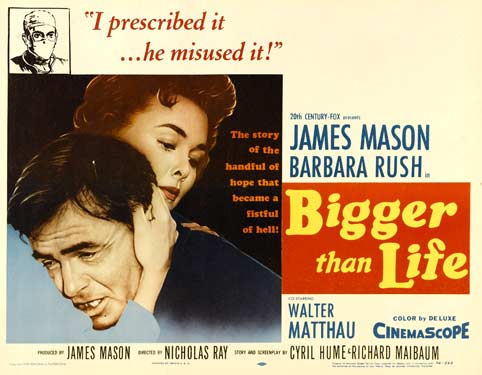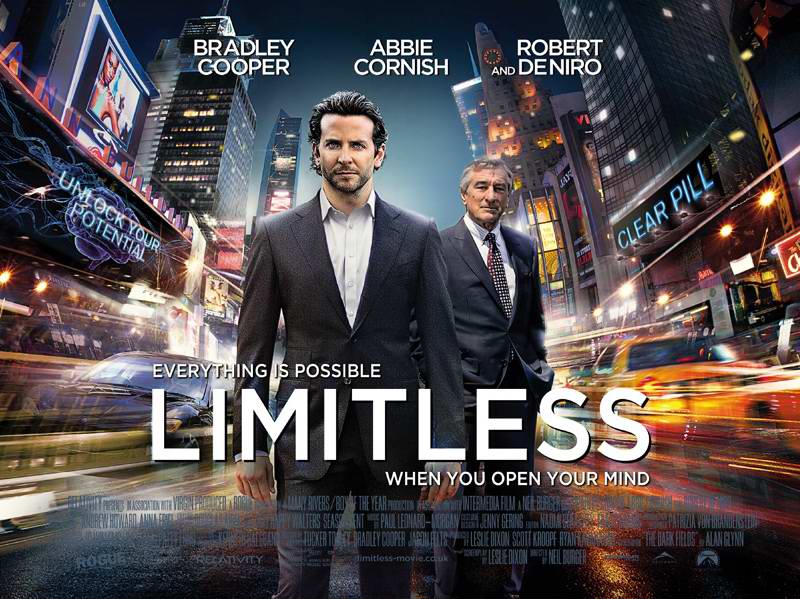|
One of the students at my recent Writing Science Fiction workshop asked, "what is the definition of Science Fiction?" It’s a good question. A vast range of stories comes under this genre heading. Stories about aliens and robots. Post-apocalyptic stories and pre-apocalyptic stories. Time-travel stories, and ones that take place in alternative histories. Stories about the far future, and stories about the distant past. Epic “space operas” and small chamber pieces. Science Fiction covers a huge amount of ground - and not all of it has that much to do with science. So how do so many diverse themes fit into a single genre? One way to answer the question is to look at two films with similar themes and see what makes one Science Fiction, and the other … something else. In BIGGER THAN LIFE (Nicholas Ray, 1958), schoolteacher Ed Avery is prescribed cortisone for a heart condition. The drug has an unexpected side-effect: he becomes suffused with a sense of personal power, megalomaniacally convinced that he has “a special plan for this world,” which he retails to a mixed response at his school’s PTA evening. Later, feeling displeased with his son, Ed decides that he must deal with him in the manner of the biblical Abraham, who was ordered by God to sacrifice his own son, Isaac. Ed’s terrified wife reminds him that the Bible story was in the nature of a test: on seeing Abraham’s obedience, God relented and sent an angel to tell the faithful father to spare Isaac. Ed answers his wife with the memorable line, “God was wrong.” But the effects of the drug never really transcend Ed’s family and immediate surroundings, and we don’t feel that his estimation of his mental powers and leadership potential is accurate. It seems, instead, that he is horribly deluded. So Bigger Than Life remains a Social or Medical Drama – maybe a Psychodrama – rather than a Science Fiction story. Let’s compare LIMITLESS (Neil Burger, 2011). When struggling writer Eddie Morra begins to take a smart drug, his intelligence actually is elevated. He can write long screeds of quality prose without effort; he has instant, detailed access to all his memories, no matter how fleeting or partial; his perceptions become extremely acute; and he can quickly synthesise all these elements into expert knowledge on virtually any subject, enabling him to earn a fortune as a Wall Street trader - evidently the fastest route he can envisage to complete financial independence. In other words, the changes that the drug has made in Eddie are tested against a wider world – and found to be real.
Later in the film, Eddie must contend with another man who is also taking the smart drug, and is using his increased capacity to the more sinister ends of masterminding a violent criminal empire. This is a strong sign that the drug is indeed effective, and that it can be put to a wide variety of applications. It’s possible to imagine a scenario in which the central conceit of Limitless is taken a step further, and just about everyone in a given society – or the world at large - has their intelligence and effectiveness raised by the drug. What would a planet full of individual geniuses, all pursuing their possibly conflicting ends, look like? That’s a question for another day, but Eddie and Ed’s experience suggests a possible working definition of Science Fiction: “A story with a novel (but plausible) twist on reality at its heart which has the potential to ripple out and affect the entire world in which the story is set.” Maybe you can come up with a much better definition? Feel free to add your thoughts. I’ll be holding the Writing Science Fiction workshop again in the not-too-distant future – do get in touch if you would like to know more. Blog post written by Ian Long.
9 Comments
|
BLOGTHE ONLY PLACE TO TALK ABOUT THE CRAFT OF SCRIPTWRITING.
|
Privacy Policy © Euroscript Limited 2020




 RSS Feed
RSS Feed


